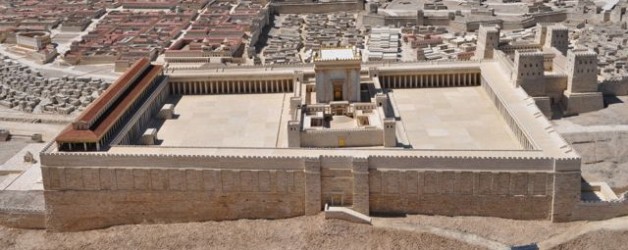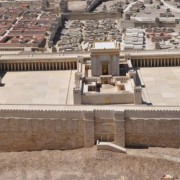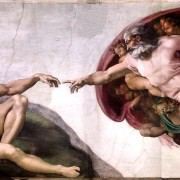The Story of God’s Presence (Part 2)
In my previous post we looked at God’s presence in the Old Testament. Let’s look at how God is moving from Eden, the Tent, and the Temple, into the New Testament.
Jesus
A new day dawned after four hundred years of silence. The presence chamber (Holy of Holies) in the Temple was vacant, but God’s presence broke into an exiled world in a new way. In John 1:14, we read that Jesus ‘tented’ among us. John intends us to recollect the Tent where God’s presence rested. The tent was an arrow pointing to something greater.[1] Jesus is described as the place of God’s presence. Jesus furthers this fulfilment in calling himself the temple saying, “Destroy this temple and in three days I will raise it up again” (Joh 2:19-21). The glory of God broke into human history in a whole new way. Previously the glory was concealed in a cloud. Now the glory was veiled in flesh. Echoes of Eden resound as Immanuel, God with us (Mat 1:23), walked among us!
Adam was unable to fully enjoy and extend the presence of God on earth because of his rebellion. In the garden of perfection, under idyllic circumstances, Adam failed, rejecting God’s good Word that brings man close to God. Jesus as the incarnate Word (Joh 1:1-2), in a world at enmity with its Creator, in a hostile wilderness, keeps God’s Word. Where both Adam and Israel failed, Jesus triumphs.
However, his accomplishment does little for us if it’s not gifted to us. Jesus as the true temple, true High Priest (Heb 7:26-27), and true sacrifice (Joh 1:29) would give up his life on the cross, the tree of death, wearing a crown of thorns (echoing the curse of toiling amongst thorns (Gen 3:18)) to open the way for exiled humanity to know the Eden-like presence of God. On the cross Jesus said to the repentant thief, “Truly, today you will be with me in paradise” (Luk 23:43, see also Rev 2:7).
The true High Priest offers the true Sacrifice and invites people into the true Temple of God’s presence.
Church
Before Jesus ascended back to the Father, he promised the disciples that he would not abandon them, but would give them a Helper of the same essence as himself.[2] This Helper is God’s Holy Spirit who comes upon the church. In fact, Jesus says that when the Holy Spirit comes upon you, the message of God’s presence will be extended in the world (Act 1:8). No longer confined to a garden in the Middle East, a wilderness in the Sinai desert, a city in Jerusalem, it will spread throughout the earth.
The Church becomes the physical place of God’s presence, as it’s the Temple of the Holy Spirit (1Co 3:16-17). God’s Spirit makes God’s people God’s dwelling (Eph 2:20-22). No longer will people need to go to a place where the presence of God is. This place/temple is extending, as God’s Spirit gathers stones making them alive (1Pe 2:4-6). As glorious as this is, the place of God’s presence is still limited as the earth is full of brokenness and pain caused by sin. God’s presence in the Church reminds us of Eden, but it’s certainly not Eden.
New Jerusalem
At the end of all things we see a new city coming down from heaven (Rev 21:10). Its shape is unlike any city ever seen before. It is something new, special, and distinct. It’s a perfect cube in shape, reminding us of the cubic Holy of Holies. Its gates are always open (Rev 21:25), indicating unrestricted access to God’s presence. A river, like in Eden, flows from the centre, God’s own throne (Rev 22:1-3). All the pain of self-rule and exile is abolished and God’s loving, good, and gracious rule is present. The people of God will know the paradise of God’s presence as “He will wipe away every tear from their eyes, and death shall be no more, neither shall there be mourning, nor crying, nor pain anymore, for the former things have passed away” (Rev 21:4).
[1] John 1:16-17 reveals that grace had been given in the giving of the Law of Moses (which include the building plans for the Tent), but when Jesus came, a whole new dimension of grace was given. We have received the grace of God’s presence directly in Jesus, above and beyond the grace of God’s presence in the tent.
[2] Joh 14:16, the word another here means “another of the same kind”.








Thanks for this panoramic look at the presence of God, Matt. Your post highlights a tension I see in the church today. The one thing the church has that the world doesn’t have is the presence of God. But it seems as if much of the church (or at least the church in the press) is concerned with being just as good, if not better than, the world. Our bands, music, venues, promotion, buildings, coffee clatches, equipment, videography, etc., seem to rival the best the world has. It seems as if there is competition between the church and the world when it comes to production value. And in one way I get this. But the subtle (or not so subtle) message sent is that if you come to Church X, you will have things just as good as if you went to any secular venue. But that is not the message of the church, nor should it be bait with Jesus as the hook. If they come and munch on our excellent music and drink our excellent coffee, at some point we will yank on the line and Jesus will be set in them. Hyperbole, yes – but you get the point.
Your post highlights the uniqueness of the church. Competition with the culture diminishes our uniqueness. I know that I will hear about the church doing the best that it can and should – I get that – but from where I sit, Jesus hasn’t been lost, He’s just lost top billing.
Tim,
Totally agree with you on this. I’m convinced that we (i.e. Christians and the Church) ought to provoke the world to jealousy by the communion we have with God and the community we share with one another within the body of Christ.
I think that it has been easier—pragmatically speaking—for the church to throw money at the whole situation, thereby increasing the production value of the church gatherings, instead of actually discovering what the realities of communion with God and genuine Christ-honoring community with one another can and should look like. Since communion with God and community with one another are the very things that were lost to humanity in the fall, there is a deep-seated longing in the soul of man for these things. If the church is a practical demonstration/expression of them, in that they are truly a reality among believers, I’m certain it would be enticing.
Amen guys,
What the Church “has on offer” is not anything that the world can offer. As helpful as excellence in all areas may be, these things should serve (not overtake) the fact that through the gospel we are brought into abiding relationship with Immanuel (God with us).
It can be easy make up for what seems to be lacking in our churches by way of God’s transforming, all-satisfying presence with things that amount to nothing more than cheap imitations.
I agree with you Tim, as great as excellence in many other areas may be, if they don’t serve our true purpose, they distract from it.
Matt,
Good stuff… is this “Part 2” of more parts? Or is this the final installment? I’m assuming it’s the final installment, as we’ve moved from Eden to the New Jerusalem.
Since we currently find ourselves living under the “Church” heading, do you suppose that since God intends to express His manifold wisdom through the church to all rulers and authorities in heavenly places (Eph. 3:10), that the church should be even more glorious than Eden?
Miles,
Bro I completely agree! It’s not that God is bringing us back to Eden itself, but something Eden-like and yet greater (i.e. Garden City of Revelation). I am amazed that the Church partakes of and enjoys something that the prophets couldn’t fully identify, and that provokes angels to look into with great longing (1 Peter 1:10-12). God is creating a people not from the side of the first Adam, but from the wounds of the Last Adam. The glory of which far exceeds that of the man formed of dust.
Thanks for highlighting this. God isn’t bringing us back full circle, rather he is spiraling up to the climactic future of his eternal plan. I should have made that more clear in my post.